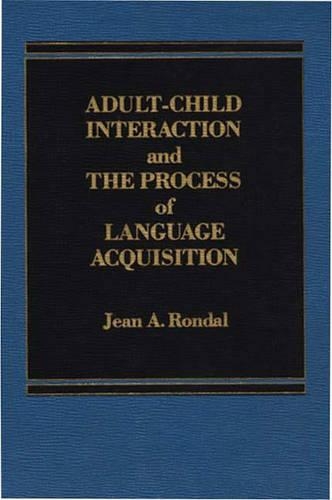
Adult-Child Interaction and the Promise of Language Acquistion
(Hardback)
Publishing Details
Adult-Child Interaction and the Promise of Language Acquistion
By (Author) Jean Rondal
Bloomsbury Publishing PLC
Praeger Publishers Inc
15th March 1985
United States
Classifications
Tertiary Education
Non Fiction
Language acquisition
Physical Properties
Hardback
236
Description
The author, a well-known development psychologist, challenges Piagetian theories of language development. Rondal studies verbal and nonverbal interactions between children and parents from a social-behavioristic perspective.
Reviews
"For somebody who has struggled trying to keep up with the outpouring of research in the field of developmental psycholinguistics, this is a refreshing and extremely valuable book. Refreshing in that the author carefully takes into account both sides of the theoretical controversy and weights the evidence pro and con. Valuable in that with 31 pages of bibliography ...there does not easily exist a work comparable in its exhaustive coverage of the literature pertaining to adult-child interaction in the process of language acquisition.... [The] author tackles motivational questions that have been largely avoided in the past. It is difficult to decide what the most important long-term contribution of this book will be: the probing theoretical analyses or the comprehensive coverage of the literature. In the latter aspect, the book can fulfill the function of a handbook for the location of studies on even quite esoteric aspects of adult-child interactions, aspects which are often missed in English publications because the studies were reported in French."-Child Development Abstracts and Bibliography
For somebody who has struggled trying to keep up with the outpouring of research in the field of developmental psycholinguistics, this is a refreshing and extremely valuable book. Refreshing in that the author carefully takes into account both sides of the theoretical controversy and weights the evidence pro and con. Valuable in that with 31 pages of bibliography ...there does not easily exist a work comparable in its exhaustive coverage of the literature pertaining to adult-child interaction in the process of language acquisition.... [The] author tackles motivational questions that have been largely avoided in the past. It is difficult to decide what the most important long-term contribution of this book will be: the probing theoretical analyses or the comprehensive coverage of the literature. In the latter aspect, the book can fulfill the function of a handbook for the location of studies on even quite esoteric aspects of adult-child interactions, aspects which are often missed in English publications because the studies were reported in French.-Child Development Abstracts and Bibliography
Author Bio
ndal /f Jean /i A.
